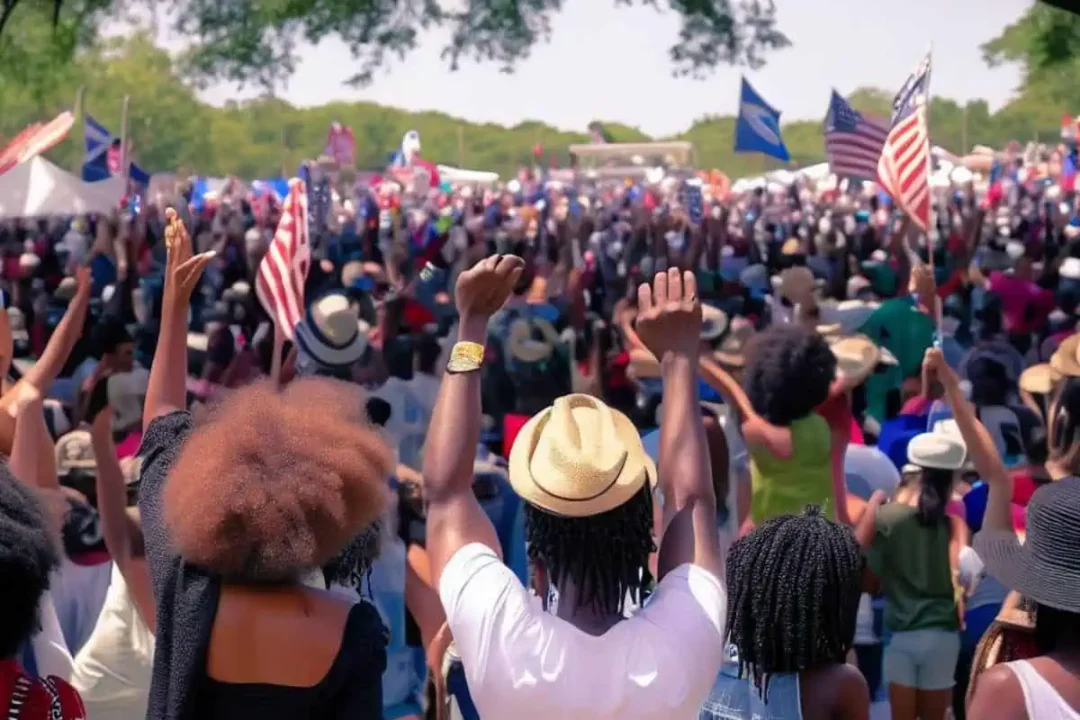Juneteenth Celebrations in Texas: History, Traditions, and 2026 Events Guide
Juneteenth celebrations in Texas represent the heart of American freedom, marking the historic day on June 19, 1865, when the last enslaved people in Galveston finally learned of their emancipation. As the birthplace of this significant holiday, the Lone Star State offers the most authentic and vibrant commemorations anywhere in the world, blending deep historical reverence with joyful community spirit.
In 2026, Texas cities like Galveston, Houston, and Austin are preparing for massive celebrations that honor the resilience of the African American community while inviting visitors to experience unique Texan traditions.

The first Juneteenth, or “Freedom Day,” occurred more than two years after the Emancipation Proclamation was signed, highlighting a period of delayed justice that still resonates in Texas history.
Today, Juneteenth is a federal holiday, but its soul remains firmly rooted in Texas soil, where families gather for “red food” feasts, historical reenactments, and parades that stretch for miles. Participating in these events across the historic streets of Galveston or at a soulful festival in Houston connects the past to a future of unity and progress.
Juneteenth in Texas: Quick Facts & 2026 Overview
| Key Detail | Information |
| Origin Date | June 19, 1865 |
| Birthplace | Galveston, Texas |
| Primary Meaning | Delayed news of emancipation reaching Texas |
| 2026 Federal Holiday | Friday, June 19, 2026 |
| Iconic Traditions | Red foods, parades, and historical readings |
| Top 2026 Locations | Galveston, Houston, Austin, Dallas, San Antonio |
The deep roots of Juneteenth in Texas provide essential details for an unforgettable visit in 2026. From the sacred grounds of Ashton Villa to the lively stages of Emancipation Park, the essential history, cultural traditions, and event lineups make Texas the premier destination for Freedom Day. This holiday evolved into a national symbol of liberty, allowing everyone to engage with a vibrant cultural legacy.
The Historical Significance of Juneteenth in Texas
Juneteenth celebrations in Texas are inseparable from the events that transpired in Galveston in the summer of 1865. Although President Abraham Lincoln had issued the Emancipation Proclamation on January 1, 1863, the news of freedom did not reach many enslaved people in the remote parts of the Confederacy until much later. Texas, being the westernmost state of the Confederacy, became a final stronghold for slavery as the Civil War drew to a close.
The turning point came on June 19, 1865, when Major General Gordon Granger arrived on the shores of Galveston with over 2,000 Union troops. Standing at the headquarters of the District of Texas, he read General Order No. 3, which informed the people of Texas that “all slaves are free.” This historic announcement triggered immediate celebrations among the newly emancipated people, who filled the streets with tears of joy and songs of liberation.
This delayed emancipation created a unique cultural legacy in Texas, where the struggle for freedom was felt more acutely due to the long wait. The arrival of General Granger and his troops was not just a military maneuver but a transformative moment that redefined the social and legal fabric of the state. For generations of Texans, June 19th became a day of sacred remembrance, far surpassing the significance of other holidays like the Fourth of July in some communities.
The Impact of General Order No. 3
General Order No. 3 was a short but revolutionary document that fundamentally changed the lives of over 250,000 enslaved individuals in Texas. It stated that there would be an “absolute equality of personal rights and rights of property” between former masters and former slaves. While the transition to true equality would take many more decades, the legal foundation for freedom was undeniably established on that day in Galveston.
The news spread quickly from the Galveston docks to the plantations of the interior, often carried by Union soldiers or by word of mouth among the freedmen. In many cases, the news was met with resistance from former slaveholders who attempted to withhold the information until after the harvest. Despite these obstacles, the spirit of freedom could not be contained, and the first informal Juneteenth celebrations began almost immediately across the state.
Traditional Juneteenth Celebrations in the Lone Star State
Texas has developed a unique set of traditions that define how Juneteenth is celebrated, many of which have now spread across the United States. One of the most recognizable traditions is the consumption of “red foods” and drinks, which hold a deep symbolic meaning for the holiday. Red symbolizes the bloodshed and sacrifice of ancestors who endured the horrors of slavery while also representing the resilience and power of the community.
Strawberry soda water is perhaps the most iconic Juneteenth beverage, a tradition that dates back to the earliest celebrations when such luxuries were rare. Red velvet cake, watermelon, and spicy red-sauce barbecue are also staples of any Juneteenth feast in Texas. These culinary traditions serve as a sensory link to the past, reminding participants of the cost of freedom while celebrating the abundance of the present.
Beyond the food, Juneteenth celebrations in Texas often feature Miss Juneteenth pageants, which focus on empowering young African American women. These pageants emphasize education, cultural heritage, and community service rather than just physical beauty. Winners often serve as ambassadors for the holiday, helping to educate the next generation about the importance of their history and the significance of the movement.
Parades and Community Gatherings
Parades are a cornerstone of Juneteenth celebrations in Texas, particularly in historic neighborhoods where the holiday has been observed for over a century. These parades often feature high-stepping marching bands, elaborate floats, and equestrian teams like the Buffalo Soldiers reenactors. The energy of a Texas Juneteenth parade is infectious, drawing thousands of spectators who line the streets to cheer and celebrate their shared heritage.
Community gatherings often follow the parades, typically held in local parks that were historically purchased by freed slaves specifically for Juneteenth celebrations. Emancipation Park in Houston is the most famous example, but dozens of smaller “Juneteenth Parks” exist throughout the state. These spaces host live music, soul food vendors, and educational booths where families can learn about their genealogy and the specific history of their local community.
The Role of the Buffalo Soldiers in Texas History
The Buffalo Soldiers played a significant role in the years following the first Juneteenth celebrations in Texas. These all-Black regiments of the U.S. Army were established in 1866, just one year after emancipation, and were largely stationed in the American West, including many forts throughout Texas. Their presence was a powerful symbol of the new status of Black men in America, transitioning from enslaved persons to uniformed defenders of the nation.
Today, Buffalo Soldier reenactment groups are a fixture at Juneteenth celebrations across the state, from El Paso to Galveston. They provide educational demonstrations that highlight the often-overlooked contributions of Black soldiers to the development of the Texas frontier. Seeing these men and women in period-accurate uniforms, often on horseback, brings a sense of pride and historical continuity to modern Freedom Day festivities.
Their participation helps to bridge the gap between the initial joy of emancipation and the complex realities of the Reconstruction era. By telling the stories of these soldiers, Juneteenth events offer a more complete picture of the African American experience in 19th-century Texas. This educational component is essential for understanding the full scope of the struggle for civil rights and the resilience required to build a life in the post-war South.
Juneteenth Culinary Traditions: Southern Heritage
The food of Juneteenth is more than just a meal; it is a profound expression of cultural identity and ancestral connection. In addition to the famous red foods, traditional Texas Juneteenth tables often feature dishes that represent luck, prosperity, and spiritual health. Collard greens and mustard greens are served to represent green for prosperity, while black-eyed peas signify luck for the coming year.
Texas barbecue is the undisputed center of most celebrations, with pitmasters often spending days preparing slow-smoked brisket and pork ribs. Many legendary Texas BBQ joints, such as those in Lockhart and Austin, host special Juneteenth events where they serve historic recipes that have been passed down through generations. The act of sharing barbecue is a communal tradition that mirrors the early gatherings where newly freed people combined their limited resources to feast together.
Red drinks have a particularly sacred place in the celebration, with roots tracing back to West African hibiscus tea (known as bissap or sorrel). In the Caribbean and the Southern United States, this evolved into the strawberry soda and red punch traditions we see today. Drinking these beverages is a way to “drink in” the spirit of the ancestors, acknowledging their suffering while celebrating the literal sweetness of the freedom they ultimately won.
Juneteenth and the Arts: Music and Murals
The arts have always been a primary vehicle for expressing the emotions and history associated with Juneteenth. In Texas, the holiday is a showcase for a wide range of creative expressions, from the soulful sounds of Delta blues to contemporary hip-hop. Many festivals feature poetry slams and dramatic readings of the Emancipation Proclamation, allowing the power of the written word to inspire a new generation of activists.
Galveston is home to one of the most significant pieces of Juneteenth art: the “Absolute Equality” mural. Located on the side of the Old Custom House, this massive 5,000-square-foot artwork depicts the journey from slavery to freedom in stunning detail. Created by artist Reginald Adams and a team of local creatives, the mural serves as a permanent landmark that invites visitors to reflect on the meaning of the holiday year-round.
In Houston and Dallas, local theaters often debut original plays that focus on the stories of the people who were in Galveston on that historic day in 1865. These performances provide a human element to the historical facts, exploring the personal triumphs and tragedies that accompanied the transition to freedom. Engaging with the arts allows Juneteenth participants to connect with the holiday on an emotional level that goes beyond what can be found in a history book.
Major 2026 Juneteenth Events in Texas
Planning your visit for Juneteenth 2026 requires understanding the diverse offerings in each major Texas city. From the coastal history of Galveston to the modern festivals of Dallas, there is a celebration for every type of traveler. Booking accommodations early is recommended, as Juneteenth has become one of the busiest travel weekends in the state, rivaling major music festivals and sporting events.
Galveston: The Birthplace Celebration
As the birthplace of the holiday, Galveston offers the most poignant and historically rich Juneteenth experience in the world. The 2026 celebration will center around the historic Ashton Villa, where the official Juneteenth Proclamation reading takes place every June 19th. Visitors can walk the “Freedom Walk,” a guided tour that visits significant sites like the Reedy Chapel AME Church and the site of the Old Custom House.
The Galveston Island Juneteenth Festival in 2026 is expected to feature a massive community picnic at Menard Park, overlooking the Gulf of Mexico. This event brings together locals and tourists for a day of live blues music, gospel performances, and some of the best barbecue in the region. For a deeper dive into history, the “Absolute Equality” mural on the corner of 22nd and Strand provides a stunning visual narrative of the emancipation story.
Houston: Emancipation Park Traditions
Houston’s Juneteenth celebrations are anchored by the historic Emancipation Park, which was founded in 1872 by former slaves who raised $1,000 to buy the land. The 2026 Emancipation Park Juneteenth Celebration will feature a two-day festival including the “Celebrate Freedom” concert, which showcases national R&B and gospel artists. The park itself is a landmark of resilience, serving as a sanctuary for Black Texans during the era of segregation.
In addition to the park events, the Houston Juneteenth Culture Fest at Avenida Houston will offer a more contemporary celebration. This event features local artisans, food trucks specializing in African and Caribbean flavors, and interactive art installations. Houston’s Third Ward also hosts a variety of grassroots events, including neighborhood block parties and youth sports tournaments that honor the spirit of the holiday.
Austin: The Central Texas Parade
The state capital of Austin hosts the Central Texas Juneteenth Parade, one of the largest and most vibrant processions in the state. In 2026, the parade will wind through East Austin, featuring hundreds of entries including local high school bands, community organizations, and vintage cars. The parade concludes at Rosewood Park, where the city hosts a massive day-long festival that attracts over 20,000 participants.
Austin’s Juneteenth festival is known for its diverse musical lineup, reflecting the city’s status as the live music capital of the world. Visitors can enjoy everything from traditional Texas blues to modern hip-hop and jazz. The George Washington Carver Museum also plays a key role, offering special exhibitions and lectures that explore the intersection of Juneteenth and the modern civil rights movement in Central Texas.
Dallas and Fort Worth: North Texas Commemorations
Dallas celebrates Juneteenth with a focus on both service and celebration, with events like the Dallas Juneteenth Food Festival taking center stage in 2026. This event, typically held at the historic Fair Park, brings together the city’s best Black-owned restaurants and food vendors. The festival also includes a “Freedom Walk” and a variety of health and wellness seminars, emphasizing the holistic improvement of the community.
In nearby Fort Worth, the focus is often on the work of Opal Lee, the “Grandmother of Juneteenth.” The Fort Worth Juneteenth Parade is a massive community event that celebrates the local history of the movement. Visitors can also visit the site of the future National Juneteenth Museum, which is set to become a global hub for education and research on the holiday’s legacy.
San Antonio: Freedom at the River Walk
San Antonio combines its unique Spanish and Mexican heritage with Juneteenth traditions, creating a multicultural celebration that is truly unique to the city. The Official Juneteenth Festival at Comanche Park in 2026 will feature a multi-day lineup of events including the “Freedom Family Fest.” This festival is known for its gospel music competitions and its focus on honoring military veterans within the African American community.
For those looking for a more central experience, the San Antonio River Walk often features special Juneteenth-themed boat tours and live music performances during the weekend. These events provide a beautiful backdrop for reflection, as the river has historically been a lifeline for the city’s diverse populations. More information is available in our guide to the 15 best things to do in San Antonio.
The Evolution of Juneteenth: State to Federal Holiday
The journey of Juneteenth from a regional Texas observance to a federally recognized holiday is a testament to the persistent advocacy of the Black community. While Juneteenth has been a state holiday in Texas since 1980, it took decades of lobbying to achieve national status. The movement gained significant momentum in 2020 following a summer of global protests for racial justice, which brought renewed attention to the significance of emancipation.
On June 17, 2021, President Joe Biden signed the Juneteenth National Independence Day Act, making June 19 the eleventh federal holiday in the United States. This historic act was supported by a bipartisan coalition in Congress, acknowledging that the story of Juneteenth is an essential part of the American narrative. The transition to a federal holiday has led to a dramatic increase in awareness and participation across all 50 states.
Many Texans emphasize that the federal recognition should not overshadow the holiday’s specific roots in Galveston. The national celebration provides an opportunity to educate the entire country about the history of slavery and the long road to freedom. It also serves as a day for all Americans to reflect on the ongoing work required to achieve the “absolute equality” promised in General Order No. 3 over 160 years ago.
Key Figures in the Juneteenth Movement
The journey from a local Texas tradition to a federal holiday was driven by the tireless efforts of several key individuals. Al Edwards, a Houston state representative, is often called the “Father of Juneteenth” for his role in passing the legislation that made Texas the first state to recognize the holiday in 1979. His vision was to ensure that the story of emancipation was never forgotten by future generations of Texans.
In recent years, Opal Lee has become the face of the national movement. At the age of 89, she began her symbolic 1,400-mile walk from Fort Worth to Washington, D.C., to advocate for Juneteenth’s recognition as a federal holiday. Her persistence was rewarded in 2021 when the national legislation was finally signed into law, with Ms. Lee standing by the President’s side in the White House.
These figures remind us that Juneteenth is not just a date in history, but a movement that requires constant advocacy and education. Their contributions have ensured that Juneteenth is now part of the national conversation about freedom and equality. Today, community leaders across Texas work year-round to plan the festivals and educational programs that define the modern holiday.
A 3-Day Juneteenth 2026 Itinerary for Texas Visitors
Experiencing the full breadth of Juneteenth history is possible through a planned 3-day itinerary through the heart of the movement. This route begins in the birthplace of the holiday and ends in the cultural hub of Houston, covering the most significant sites. Renting a car is recommended to prepare for a weekend of deep learning and joyful celebration.
Day 1: Galveston – The Birthplace
Start your journey in Galveston Island on the morning of June 19th. Attend the official proclamation reading at Ashton Villa at 10:00 AM, then take a self-guided walk to the “Absolute Equality” mural on the Strand. Spend the afternoon at the Galveston Island Juneteenth Festival at Menard Park, enjoying live music and the sea breeze. Finish the day with a dinner at a local seafood or BBQ establishment near the historic Seawall.
Day 2: The Road to Freedom – Galveston to Houston
Drive north toward Houston, stopping at some of the smaller historic communities along the I-45 corridor. Visit the Reedy Chapel AME Church in Galveston before you leave, as it was the first AME church in Texas and played a key role in the early emancipation years. Arrive in Houston by early afternoon and head to the Emancipation Park Juneteenth Celebration. Explore the park’s history and enjoy the national musical acts that headline the main stage in the evening.
Day 3: Houston – Cultural Immersion
Spend your final day diving deeper into Houston’s rich African American heritage. Start with the Houston Juneteenth Culture Fest at Avenida Houston, where you can browse local art and enjoy interactive installations. In the afternoon, explore the Third Ward, visiting historic sites and supporting local Black-owned cafes and boutiques. Conclude your trip with a visit to the Project Row Houses, a unique community-based arts and culture organization that embodies the spirit of resilience and creativity.
Planning Your Juneteenth 2026 Trip to Texas
Planning a Juneteenth 2026 trip to Texas requires careful consideration of the climate, as June is notoriously hot and humid. Temperatures often exceed 90 degrees, making hydration and seeking shaded or indoor festivals essential for comfort. Many celebrations provide misting stations and plenty of “red soda” to help visitors stay cool during the peak heat of the day.
Transportation is another key factor, as many of the best celebrations are spread across large metropolitan areas. In cities like Houston and Dallas, having a car is often necessary to visit multiple event sites, though rideshare services are readily available. For the Galveston celebration, staying on the island is highly recommended to avoid heavy traffic on the I-45 causeway. Booking your hotel at least six months in advance ensures the best rates and availability.
Supporting local Black-owned businesses is a powerful way to honor the spirit of Juneteenth during your visit. Whether it is a legendary BBQ joint in Austin or a boutique clothing store in Dallas, these contributions support the community’s economic strength. You can discover more places to visit in Texas in our comprehensive guides to the Lone Star State.
Final Takeaways: The Legacy of Freedom in Texas
Juneteenth celebrations in Texas are more than just a holiday; they are a profound expression of a community’s journey from bondage to freedom. While the holiday is now celebrated across the nation, there is a depth of history and a vibrancy of tradition in Texas that cannot be replicated elsewhere. Visiting the birthplace of Juneteenth allows participation in a living history that continues to shape the identity of the Lone Star State.
As we look toward 2026, the importance of Juneteenth only continues to grow. It serves as an annual reminder of the work that remains to be done in the pursuit of true equality, while celebrating the incredible progress that has been made. Attending a Juneteenth celebration in Texas is an experience that provides a deeper appreciation for the meaning of freedom.
For more information on upcoming Texas events, check out our guide to annual festivals celebrated in Texas. If you are planning a longer trip, don’t miss our recommendations for the best things to do in Dallas and the 15 best things to do in Austin Texas.
FAQs on Juneteenth Celebrations in Texas
What is the primary meaning of “red foods” on Juneteenth?
Red foods like strawberry soda, watermelon, and red velvet cake symbolize the bloodshed and resilience of enslaved ancestors. The color red has deep roots in West African cultures, representing strength, sacrifice, and spiritual transition. In the context of Juneteenth, it is a way to honor those who suffered while celebrating the sweetness of freedom.
Is Galveston really the birthplace of Juneteenth?
Yes, Galveston is recognized as the birthplace of Juneteenth because it was the location where General Gordon Granger first read General Order No. 3 on June 19, 1865. While slavery had been abolished on paper years earlier, Galveston was the last major port in the Confederacy to receive and enforce the news of emancipation.
Can anyone attend Juneteenth celebrations in Texas?
Absolutely! Juneteenth celebrations in Texas are inclusive events that welcome everyone to learn about and celebrate African American history and culture. While the holiday holds special significance for the Black community, the themes of freedom and resilience are universal, and the festivals are a great way for all Texans and visitors to build community.
What are the best cities for a first-time Juneteenth visitor?
Galveston and Houston are widely considered the top choices for first-time visitors due to their deep historical connections. Galveston offers the “Birthplace” experience with many historic sites, while Houston’s Emancipation Park provides a large-scale, soulful festival atmosphere. Austin and Dallas also offer fantastic, high-energy celebrations that are well-suited for families and music lovers.
Is Juneteenth a state holiday in Texas?
Yes, Texas was the first state in the nation to make Juneteenth an official state holiday, passing the legislation in 1979. Since then, it has become a federal holiday as well, but Texas remains the leader in terms of the number and scale of public celebrations held each year.
Visit Visit Galveston for more details on 2026 island events. Explore the Houston Juneteenth website for upcoming festival lineups and cultural activations. For statewide travel planning, check out Travel Texas, the official tourism site for the Lone Star State.





